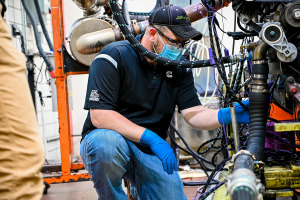
McDonald’s lawsuit accuses beef suppliers of price fixing
The fast-food chain alleges the suppliers coordinated to fix, raise, stabilize, or maintain the price of beef at “supracompetitive levels.”

The fast-food chain alleges the suppliers coordinated to fix, raise, stabilize, or maintain the price of beef at “supracompetitive levels.”
Suppliers say they remain concerned about the retailer’s survival and have cut off or cut back on merchandise they ship to the company.
Both the House and the Senate have passed major legislation on the matter, and the effort is one of lawmakers’ final opportunities before the November elections to show voters they are addressing the nation’s strained supply chains.

From automobiles to canned goods, certain items have been in short supply, and for a variety of reasons.
In a survey of business conditions, the Fed’s 12 regional banks found that the economy continued to grow at a modest-to-moderate pace. But because of supply chain problems, price increases were reported to be widespread across the economy.
Shortages and price spikes are now cutting into one of the humblest yet most vital links in the global manufacturing supply chain: The plastic pellets that go into a vast universe of products ranging from cereal bags to medical devices, automotive interiors to bicycle helmets.
Two new supplier-diversity programs are launching in Indianapolis as local companies and other organizations try to make good on their equity promises from last year.

Supply chain issues and struggles to hire employees are affecting how small businesses are operating—including the hours they are open and the services or products they can provide, according to a survey by the National Federation of Independent Business.
Even as U.S. COVID-19 cases have declined, supply-chain problems have persisted. For a variety of reasons—from shifts in consumer behavior to a plummet in available airline flights to congestion at ocean ports—the pandemic has scrambled everything across a wide swath of industries.
The scarcity of chips could cloud some of the pandemic recovery if it continues to hamper manufacturing in the coming months.
The Institute for Supply Management’s survey of businesses showed that 16 of 18 manufacturing industries showed growth in January. The contracting industries were printing and petroleum.
Staples previously tried to buy Office Depot, but the $6.3 billion acquisition was called off in 2016 amid antitrust scrutiny.
Officials announced Friday that Indiana Wheel Corp. plans to spend nearly $23 million to purchase, renovate and equip the facility, where it will hire up to 117 workers.
Volkswagen AG is renewing efforts to sell minority stakes in non-core operations to streamline its business and focus on the main passenger-car brands, according to people familiar with the matter.
Vehicles made by Toyota, Honda, Kia, Hyundai, Mitsubishi and Fiat Chrysler from the 2010 through 2019 model years are included in the probe, which was revealed Tuesday in documents posted by the National Highway Traffic Safety Administration.

Officials for the Indianapolis-based transmission giant tell city officials that the project would create 193 jobs that pay an average of $20.39 per hour, as well as help it retain current employees.
Cars from Subaru, Tesla, BMW, Volkswagen, Daimler Vans, Mercedes and Ferrari are included in the latest round of recalls involving airbag inflators that can hurl shrapnel into drivers and passengers.
The subsidiary of Israel-based Omen Casting Group wants to boost production to help meet demand in America and Germany for its aluminum drivelines, steering components and oil pumps.
Suppliers are still gun-shy after their experience with Toys ‘R’ Us, which went out of business months after filing for Chapter 11 reorganization in the fall of 2017, leaving them with millions of dollars in unpaid bills.
Indianapolis-based Allegiant International has seen tremendous growth in recent years thanks to its supply-chain work with General Motors.